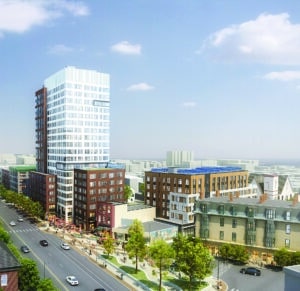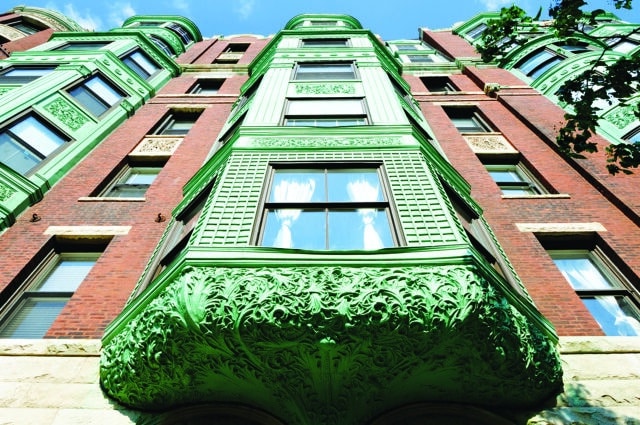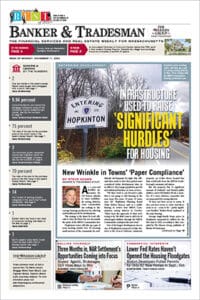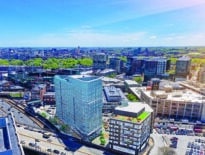
Developers of the Market Central apartments in Cambridge have cut asking rents by 10 percent to attract leases Image courtesy of CBT Architects
Owners of new apartment buildings in the Boston area are facing unprecedented times trying to fill units amid the coronavirus outbreak and economic downturn that’s left many would-be tenants wary of moving into unfamiliar and oftentimes more expensive living quarters.
The result has been delays in filling up buildings, reduction in rental prices and sometimes expensive concessions, such as two months of free rent, to get tenants to sign leases. Yet industry executives are confident the market will eventually stabilize, considering there’s still a housing shortage in Greater Boston and demand for rental units and homes remains strong.
But the market will probably stay bumpy in the short term, multifamily development executives say.
“The entire summer leasing process has been upended,” said Jonathan Andrews, development director at Twining Properties, which this past winter started to lease up the last two of three new luxury buildings at its 308-unit Market Central complex on Massachusetts Avenue in Cambridge’s Central Square.
“Nobody is really sure what’s going to happen,” Andrews said. “No one wants to move in the middle of a pandemic.”
Any Void Creates Disruption
Market Central’s third building received its certificate of occupation in March just as the coronavirus hit with full force and should have been about 40 percent leased at this time, Andrews said. Instead, it’s only 20 to 25 percent leased, despite rental price cuts of up to 10 percent and various concessions.
The building’s units vary in price, from roughly $2,800 for a studio, $3,800 for a one-bedroom unit and $5,000 and up for a two-bedroom unit – and all of those prices have fallen by as much as 10 percent as a result of market turmoil, Andrews said.
Andrews said one of the main problems facing the rental market is the uncertainty surrounding college students, both undergrads and graduate students, and their sometimes–affluent parents, many of whom are unwilling to shell out big bucks for higher-end apartments when it’s not clear how or when campuses will reopen this fall in Boston.
The situation has caused a bottom-up flux within the entire rental market in Boston, freeing up spaces and allowing non-students to shop around for units, sometimes at reduced rental prices, according to apartment industry experts.
“There’s a softness in the market we’ve never seen before,” said Sue Hawkes, managing director of The Collaborative Cos., which oversees rentals at many top luxury-apartment complexes in Boston. “These are unprecedented times.”
Students may not drive the luxury market, Hawkes stressed. But any voids in the overall rental market can ultimately create disruptions for all landlords. In the case of students hesitating to fill spaces, non-student tenants end up having more rental choices and leverage that when negotiating apartment leases, Hawkes said.
The result has been “price adjustments” that the normally tight Boston housing market hasn’t seen in recent memory, Hawkes said. Vacancy rates in some existing properties have also inched up.

While students don’t rent most luxury units, substantial disruptions in any part of the rental market give all renters leverage to negotiate better rents, or simply shop for better deals.
Top-Tier Properties Remain Insulated
The ripple-up effect hasn’t been felt too much at the very top of the luxury-living market, such as at The Hub50 House, the new 400-plus–unit complex being built next to TD Garden, Hawkes said. The Hub50House lease-ups have been strong, though they slowed down this past spring due to social-distancing restrictions and a hesitancy by some tenants to sign leases too quickly amid economic uncertainties, Hawkes said.
Industry executives stress that not all properties, luxury and non-luxury alike, are seeing major market disruptions. Sometimes it all depends on location.
Brookline’s City Realty, owner of about 800 rental units in more than 100 big and small buildings across Greater Boston, recently completed a new, 23-unit complex on Market Street in Brighton. Five of the units are rentals, and it’s taken longer than expected to lease them out, says Jim Caruso, vice president of operations at City Realty.
The reason: It’s all about the “unknowns,” particularly for potential student tenants who don’t know yet when, and to what extent, universities will reopen campuses this fall.
Still, City Realty is getting inquiries from would-be renters – and Caruso said he fully expects a rush of lease signings as the fall semester approaches.
As for the hundreds of City Realty’s existing units spread around the region, it’s taken more of an effort to rent apartments, as the company and potential tenants alike have had to rely on “virtual tours” for pre-lease viewings, Caruso said.
Adding up all the challenges facing the market, Caruso said there’s “definitely been flux and change,” with some moderate price softening.
Tenants Risk-Averse
In Revere, construction of the 75-unit “Ninety-0” complex right on Ocean Avenue in Revere Beach is expected to be finished later this fall. Oleg Uritsky, president of co-developer Helge Capital, said the owners would probably be marketing Ninety-0 at this point. But the company has decided to hold off for about a month until the “dust settles,” he said.
“We’re monitoring the markets. Nobody knows how this will play out at this point,” Uritsky said.
Helge Capital, which also owns multifamily properties in Dorchester, Hyde Park, Lynn and elsewhere in the region, is seeing a great reluctance on the part of tenants to move out of the firm’s nearly 600 existing units, with tenants not wanting to take risks during the pandemic and difficult economic times.
Still, Uritsky remains confident that the rental market will stabilize in coming months, assuming there’s not another surge in coronavirus cases and assuming the economy slowly recovers.
In particular, he noted that Revere Beach, which has seen a slew of luxury residential developments in recent years, is in good shape to weather the current pandemic and economic storms.
The area provides future Ninety–0 tenants with beachfront vistas and amenities should they need to work from home during the pandemic – and easy access to the Blue Line if they need to work in Boston.
“We remain very optimistic,” said Uritsk of Ninety-0’s prospects.






